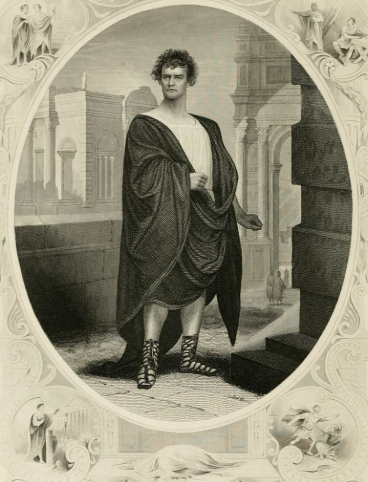“Workshop” Doesn’t Need Any Work
This past weekend, Ghostlight presented “Workshop,” a play written and directed by Miles Garcia ’25. Joe Sweeney ’25 reviews the piece, expressing appreciation for its treatment of the unsaid.

The beginning of “Workshop,” an original play from Ghostlight, written and directed by Miles Garcia ’25, is a little boring. Will (Lucas Bernstein ’25) sits alone in an empty room. He stares at his computer. He checks the time. Eventually he just starts making weird noises to himself. In all the chaos that followed — all the strange outbursts, explosive misunderstandings, wince-worthy intimacies — I sometimes wondered what it would be like to just sit with one of the characters. Then I’d remember the beginning: Oh. Right. It would be boring. Well, I guess that’s the question answered. Shall we bring in the people?
In the next scene they’ve all filed in — eight teens, ranging in age from high school to college freshmen, and Mr. Holcroft (Clay Zachery ’23), their instructor for a week-long summer writing workshop. That’s all there really is to the play's plot, at least in terms of premise. The rest is just kinetic energy: a room of young people in the midst of reinventing themselves, trying to understand each other and trying to be understood, spinning stories that grind, shiver and fly through the air.
They start by going around the room introducing themselves with various notable stories, from which I’ll select a few highlights. There’s Anya (Phoebe Mugford ’25), who the audience learns is an adventurous spirit (she scores a 25 on the Rice Purity Test, to say the least) but who introduces herself with an innocent story from her childhood. Sitting alone at recess, a girl comes up to her and asks to play foursquare. At first, Anya tries to turn her away, but the girl persists, and Anya agrees to play. But while Anya is playing, her pants keep falling down. Trying to save herself from embarrassment, she tells the other girls “My mom must’ve not tightened my pants that morning.” Despite this, she continues to play foursquare with those girls for the rest of year, “and what’s funny” is that she “didn’t even want to.” Recounting this Anya laughs hysterically, in the literal sense of the word, as if she cannot tell the story without losing her mind.
There’s Nate (Tim Carroll ’25), a jock who never gets over his anxiety that he doesn’t quite fit in with the group (an affect that Carroll sustains excellently throughout the play’s runtime). He starts his introduction by saying his dog died, hits a dead end, and nothing more to that story. He thinks, and then all at once he’s animated with prophetic intensity to tell a bizarre tale about cereal (which everyone seems to enjoy). The story reaches its climax with Nate stealing and devouring cereal with such ferocity that his mom breaks down in tears. “Really?” someone asks. Uh, no, Nate responds, unsteadied. “That was an, uh, embellishment.” He looks over at Mr. Holcroft. That’s called an embellishment, right? Holcroft quietly nods. Right.
There’s Peter (Matt Vitelli ’24) a freshman. “In highschool,” he clarifies. Holcroft smiles wanly. “We know.” Peter smiles back, uncomprehending and slightly fearful. He commences his narrative: “My cat died.” Sydney (Eleanor Walsh ’25) covers her mouth in shocked sympathy: “I’m so sorry.” Peter looks at her, puzzled. “Oh no…did you not…” Turns out he’s only doing a bit; a callback to Nate’s dead dog. Unfortunately no one gets the joke. It will be the first of many times Peter renders himself incomprehensible (and for that reason, the audience should never underestimate him. Vitelli’s performance is nothing less than a tour-de-force; if you think you know Peter, then another thing is coming).
What to make of all this? There are many points of focus. Social realism, for one — realism in the portrayal of interactions between kids that don’t really know each other. The dialogue sounds like natural speech, and so do the monologues. The characters sound and act like people. “There are people in everyone’s lives that they know that are like these characters,” Carroll said to me in an interview. Moreover, many of the players felt they were essentially typecast for their role. Bernstein said that his character “reminded him a lot of himself in high school” and even that he felt as if “[Garcia] wrote the part with him in mind.”
It is this surface of realism that makes the play so tantalizing. Characters act from motives that are obscure, half-intimated and seemingly unconscious. “The relationships are interesting because there’s a lot that’s unsaid,” noted Zoe Jonas ’25, who plays Lexie, a charmingly sarcastic figure (she can’t think of a story for her introduction because her “mind is literally blank,” which “sounds like an excuse but it's not.” This line is delivered perfectly – the moment it was said I knew exactly who her character was supposed to be). What’s really important about any given scene is anyone’s guess.
While the play admits to being distrustful about blurring the line between fiction and reality (Holcroft expresses these doubts explicitly in an inspired rant), it also embraces the joy of blurring the truth. Thus the guessing-at-what’s-important is not tedious but rather delightful. Carroll, Jonas and Bernstein all reported that their favorite line in the play is “that is so baller.” Nate delivers this line after hearing Anya’s story about a guy who wanted to kiss her while he had mono. Is that something a real person would say? The play convinces me that the question both does and does not matter.
For me, “Workshop” is all about the imagination. I could go on and on about the play’s details. What I want to do now, though, is focus on how my imagination has been captured. The scenes that speak to me the most are three moments shared between Adam (Slate Taylor ’25, who describes his character as a “well-meaning moron”) and Sunni (Deb Thayer ’24).
The first scene, between just the two of them, is spent sharing confidences. Sunni tells Adam she has difficulty controlling her anger towards people that disappoint her, so much so that she would rather “erase them from her life” to give them “the silent treatment.” The audience never finds out why she tells Adam this: maybe she has a crush on him, or maybe she’s trying to symbolically make up for all the annoying people in her life by being honest with the most annoying person she knows (in other words, complete opposite motivations – the beauty of the play is held in the moments where its characters could be speaking and acting from one extreme or the other, or from anywhere in between) . Either way, Adam commiserates by offering some advice. It falls flat; Sunni acknowledges his good intentions but feels compelled to say that he “actually just sounds like really stupid.” Adam just takes this, deflated. The scene ends. Awkward.
The second scene is with the whole group. Sunni shares a short story, and Adam lays on needling criticism after criticism (both of Sunni’s story and how she responds to his critique). Tensions reach a near-boiling point, and yet there is a moment when it seems things might simmer down (it is, after all, only a writing workshop) That is, until Adam slides in one final barb:
“You aren’t gonna give me the silent treatment now, are you Sunni?”
Several gasps went out from the audience.
It’s a tease, and all teasing is cruel, of course. But it’s also a testing of boundaries; ‘what can I say to you? will you still like me after I say it?’ And so beneath Adam’s cruelty there is a tone of uncertain need, the desire to know where he stands in Sunni’s affections.
Sunni only hears the cruelty, and blows up accordingly. The fact that it is only a writing workshop does not mitigate her fury. Actually, it only heightens her fury. How is it that people I hardly know, who I’m only related to by this stupid summer camp — how is it that they can make me feel this way about myself?
And so, there’s a third scene with just them two again, trying to fit the pieces back together. Adam tepidly apologizes for being such a jerk; Sunni affirms that he was a jerk. He asks her if she forgives him. She pauses, but only for a moment. She says she “doesn’t forgive people.” Still, she says — even though he “actually really hurt” her, there will come a time when she simply “won’t care anymore.”
Adam has no idea how to respond to this and instead pulls up the Wikipedia page on famous people who died on the toilet, reading in loud disbelief while Sunni digests his words in silence. Eventually he realizes that things will remain as they are and stops. The scene ends.
I am still amazed, days after seeing the play, at this moment. Right before my eyes, before I can even notice it, the mere awkwardness between these two characters transforms into something that is almost unbearable. The implication behind Sunni’s words is so painfully obvious: she does not, or cannot, forgive herself, for anything. The audience has not been given enough information to know why this is the case. All we have is Sunni herself, who we wish we could give a word of advice, a look of sympathy, a hug.
Instead, Adam sits in our place, reading about people dying on toilets. I am genuinely upset watching him – Adam, who wants something so badly from Sunni (he doesn’t even know what) that he hears nothing at all.
There’s tragedy in this, and yet the scene itself is so undramatic. Strangely, as I continue to watch him, my anger fades and is replaced with baffled recognition – as the scene drags on, it resembles more and more a scene from my own life, a memory that I had forgotten because it seemed unimportant. And so, I remember slowly realizing that, in my own life, I am probably more like Adam than I will ever know. I am not the one who hears. I am the one who hears nothing, and I have always been, and I will always be.
In a way, what I realized is obvious enough. Of course we are all ignorant to some non-zero extent; that is the price you pay for being yourself, and not anyone else. Yet as I watch Sunni and Adam – as I watch what is lost, what no one even knew was there – I wonder if that is something I will ever truly be able to accept.
In the play’s penultimate scene, Sydney reads a poem about rain. She discusses the chaos of the collisions of drops, bonding to each other and tearing apart. Really, though, the poem is about the “river of time,” and moving on. Life goes on after summer camp, after high school, after college, even. So don’t spend your life trying to get over the life you never had.
Unless you have to — ah! Unless you have to.




Comments ()